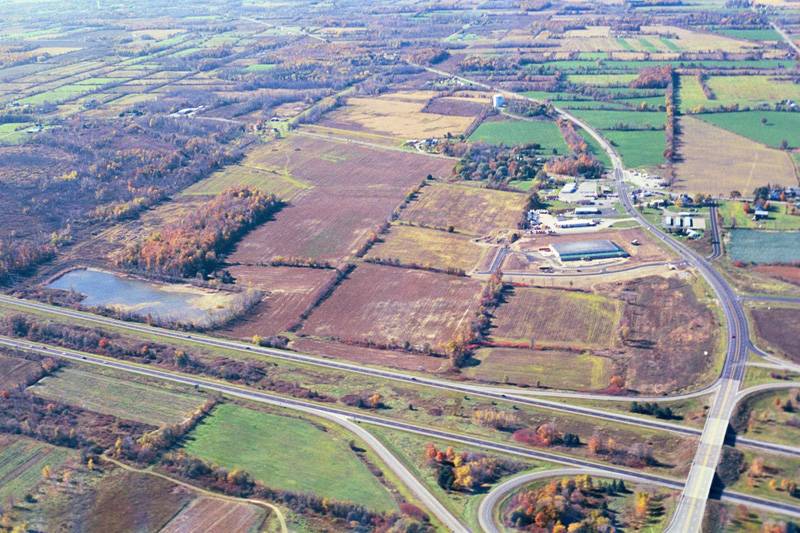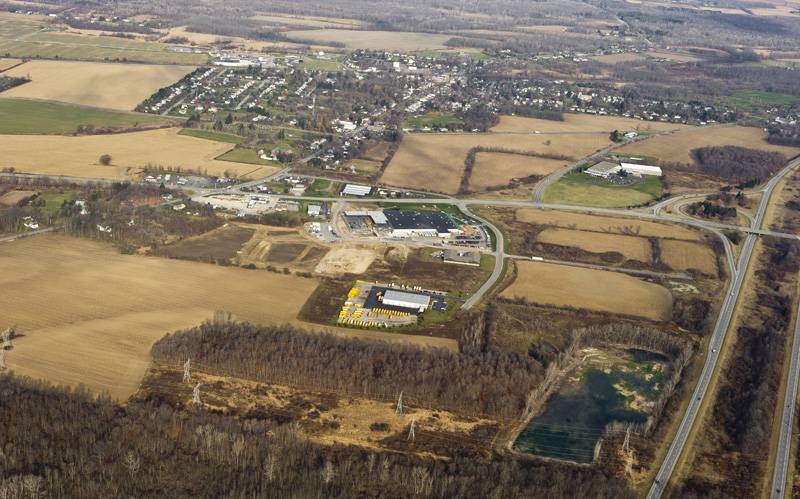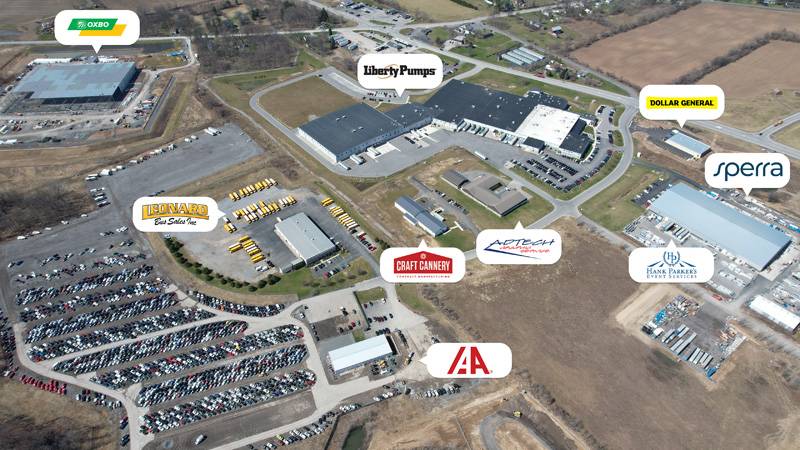Masse responds to critics of economic development: 'These projects are real. They’re here'

Misconceptions about economic development incentives persist in Genesee County, suggests Mark Masse, president and CEO of the Genesee County Economic Development Center, but the results at Apple Tree Acres in Bergen show a different reality: more jobs, higher payroll, and a growing tax base.
Masse met with The Batavian on Tuesday to discuss a recent case study that the agency presented at its annual meeting two weeks ago.
“We wanted to take a look at this as a case study to dispel a lot of the myths that we hear constantly about IDAs and incentives—that after 10 years and the pilot expires, companies are going to leave, that they never meet their job creation goals, all of those types of things,” Masse said.
The companies currently in Apple Tree Acres, collectively, initially pledged to create 119 jobs. The companies have created at least 419 jobs (companies no longer under a PILOT agreement do not report employment numbers annually, so the agency is including their numbers from the most recent annual report filed).
Combined, the companies maintain a payroll of at least $30 million.
The PILOT payment (payments in lieu of taxes) and property taxes being paid to local taxing jurisdictions is $343,000 annually.
“That is 28 times what that would have been had it remained ag land and under an ag exemption," Masse said. "By the time all the PILOTs roll off, it’ll be a million dollars in property taxes.”
Apple Tree Acres, which began development around 1999, is now fully sold out following the decision by Oxbo International Corporation to move from Byron to a new plant at Apple Tree. Construction began in September and is expected to be completed by the end of this year.
The park has attracted a mix of new and expanding local businesses. Liberty Pumps, the first tenant, has grown from 10 employees to more than 300. Masse noted that Oxbo, which considered building in Wisconsin, ultimately chose Bergen because the site fit their needs better.
Oxbo will open with 140 employees and expects to create 60 new jobs once fully operational.
Masse addressed the common misperception that incentives are simply cash handouts.
“People think we’re handing out bags of cash to companies and we are not,” he said. “If they didn’t build, then there are no incentives.”
He also explained that corporate businesses draw significantly less in municipal services than residential properties, which means the taxes and PILOTs the companies pay help subsidize services for residents.
“Any corporation with the taxes they’re paying is helping to subsidize the cost of municipal services for the residents,” Masse said. “So having businesses like this, even under PILOTs, helps to defer a lot of those municipal service costs that residents are paying for.”
Multiple companies at Apple Tree Acres have completed their PILOT agreements and remain in operation, exceeding their initial job projections. They didn't move away, as critics often suggest such companies do once the tax incentives expire.
“Ad Tech and Leonard Bus have been off of their PILOTs for about six years now, and they’re still going strong with no issues,” Masse said. “Most of the others are still kind of in the middle of their PILOT schedules.”
The park currently hosts eight businesses, including a store for the ubiquitous retail giant Dollar General, a recent addition, which Masse said chose the site for its location, the number of employees and businesses at the park, and the daily traffic from the park and nearby I-490.
The impact of Apple Tree Acres extends beyond direct employment and tax revenue. Masse pointed out that companies in the park hire local contractors, vendors, and service providers, creating additional economic benefits that are not captured in the employment numbers.
“If they sub out, if they hire a local mowing company to mow, landscaping company, window cleaners, their suppliers that are paying their truck drivers to bring in product and take product out—those companies aren’t paying those salaries (in the calculation of annual salaries mentioned above), but those people do have jobs and are being paid because of this particular development,” Masse said.
The Genesee Valley Agri-Business Park in Batavia offers another example of the long-term impact of economic development projects.
Masse noted that H.P. Hood, which took over a facility originally built by Pepsi Mueller, has invested heavily in the site and now exceeds the original job creation projections.
“Hood just recently won a national award for that facility as well. On the national food manufacturing scale, the Hood facility is known as one of the best in the country, if not the world,” Masse said. “Hood thinks so highly of Batavia, and we’re so glad they’re here that they bought some of the additional acreage there to plan for future expansions, because a lot of their other places are landlocked. So if they’re going to expand again, it’s going to be in Batavia.”
Upstate Niagara, which bought the former Alpina yogurt plant, has also exceeded job projections and uses local milk, supporting area farmers.
The Ag Park still has 20 acres available, with CH4 Biogas holding a right of first refusal for a biodigester facility and J&L Ice planning a new facility.
Buffalo East in Pembroke has overcome significant site challenges, including extensive wetlands, to attract new investment.
Yancey’s Fancy built a 112,000-square-foot facility in late 2015. The facility occupies 12 acres and represents a capital investment of $20.6 million. J&R Fancher Property Holdings completed a mixed-use development in 2022 and is currently working on approvals for two 10-unit townhouse complexes.
“That’s going to end up being a very beautiful park when it’s completed,” Masse said.
Gateway I, developed in the mid-1990s, and Gateway II, developed in the early 2000s, have both generated substantial economic activity.
Infrastructure investments for the Gateway II have attracted companies like Milton CAT, LandPro, New York Bus Sales, and SCP Pools along East and West Saile drives.
“You’ve seen a lot of other companies gobble up that acreage because of the available infrastructure that was funded to put in the park,” Masse said. “We’re going to take a look and see, from a case study perspective, what the park generates, and then what the spin-off outside of the park generates as well for an overall economic impact.”
Masse emphasized that the results at these business parks are not theoretical.
“These projects are real. They’re here. You can go drive out and look at them, and as I said, you can see the cars in the parking lot of the people who are working there,” Masse said. “We have to be competitive on these incentives, on these abatements, because if we aren’t, these companies will build, but they won’t build here, and then we will lose not only the workforce and the people we have, you’ll lose the community efforts that a lot of these companies do.”
He explained that the benefits of these projects extend into the fabric of the community.
“All of these employees have kids in the school system. They have kids in Scouts, Girl Scouts, and Boy Scouts. They’re always selling things. They’re fundraising for different causes. All of these things are happening inside of these facilities in our communities to benefit our communities," he said. "And if these companies weren’t here, I don’t know where that would come from, and that is a piece of economic impact that is never measured, that nobody ever wants to talk about, but it is vital to the survival of your kids’ T-ball team, your kids’ soccer team.”


